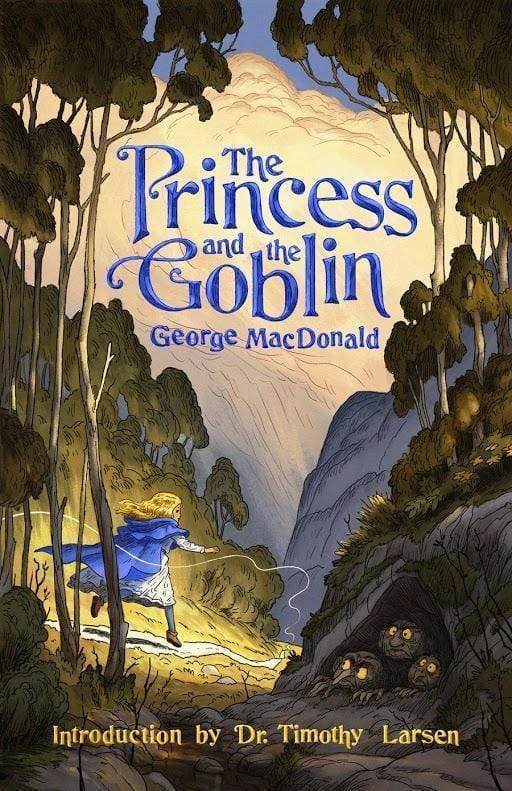Lenten Devotional (22) and my Review of the Princess and the Goblin by George MacDonald
Do Demons Drink Wine?
Romans 12:11: Never be lacking in zeal, but keep your spiritual fervor, serving the Lord.
I have had the luxury of traveling all over the country these last many years, and the one lesson you learn is that on a journey, you don’t have the luxury of bringing everything you want. You may not be able to take those cherished books or favorite snacks. It would be best if you learned to be precise and strategic.
The season of Lent reminds us that the journey is about bare minimums. What do we truly treasure in this life? Do I love the wrong things? Where do I see myself at the end of this journey? What kind of person will I be? What kind of person am I now? What areas have I indulged in that have not brought me closer to Jesus but taken me farther away? All journeys call us to examine what we need and how we want to travel.
This is a season of self-examination. Don’t end this journey the same way you started. Journey to Easter poorer in worldly fashion but richer in the treasures of Jesus. Do not lack in zeal; prepare wisely in the remaining days.
Prayer: O, Father, I am selfish in so many ways. I seek only after my well-being before that of my brother and sister. Change me to see that my pride is destroying my relationships and my communion with you. Bless me and enrich me with zeal for your service through Christ our Lord, amen.
~~~~~~
Notations:
*I am so pleased to hear so many folks—including men’s gatherings—using these brief devotionals to start their day. There are 18 days left in Lenten-tide.
**Reading through Tietz’s biography of Barth, you get little psychological profiles. Barth’s father, Johann Fritz, studied under Friedrich Nitzsche in Basel. He writes that while Nietzsche was brilliant, he did not suffer “the slightest dire influence from him” (8)." Nietzsche was, and may still be, the most influential atheist since the 19th century.
***It was such a delight to finish George MacDonald’s The Prince and the Goblin. I read through most of it and listened through the rest, allowing me to get the double experience of taste and sound. Here is my review of this magical work:
A Review of the Princess and the Goblin by George MacDonald
Chesterton wrote of the Princess and the Goblin that it “remains the most real, the most realistic, in the exact sense of the phrase the most like life.” This influential literary master adds praise to a book that he claims helped him to see things differently.
Chesterton’s synopsis is like a balm to my soul. I, too, am always eager to see things differently. I am delighted to see ideas and stories shaping people’s lives and helping them navigate their own religious experiences and challenges. Stories are food for the soul of those who thirsts for righteousness.
Timothy Larsen ponders the question in his introduction to the book: “What are you afraid of?” It is the question of fear that decorates this great classic. MacDonald wants to put fear at the forefront of little children. He wants them to grow in maturity, facing dragons and wild beasts.
Princess Irene and Fear
It’s the lovely and innocent Irene, who, as an eight-year-old Princess, has to navigate life in a half-castle because, MacDonald notes, her mother was not very strong. It appears she has died, and now she must journey alone. Her maturity will come through her desire to see life anew, to live, as Chesterton paints it, “most life like.”
While her mother is not involved in her development, it is clear that she embraces the all-encompassing gravitas of a Father/King, who gallops with sophistication and speaks Solomonically. She is a daddy’s girl, and it is her father’s words she treasures in those rare moments of his appearance.
Irene is guided by a relative who takes her by the hand by an invisible thread; invisible, that is, to others, but for Irene, it is the incarnation of love. It takes her back every time to the long-winding stairs of her abode and the embrace of her great-great-grandmother. This mysterious character appears in fantastical ways to bring Irene a sense of the magical. The “old lady” is not some imaginative figure but is very near to her and plays the role of comforter and rescuer throughout the narrative. She is a compass for the young and virtuous little Princess.
Curdie and Rhymes
The other character to grace the pages is the young Curdie, the son of a miner, who does not inherit such care of royal life but lives royally in his adventures and musical rhythms. These rhythms allow him to frighten goblins who are “grotesque both in face and form.” These creatures roam the land seeking to overthrow the kingdom and impose their own world. But Curdie is a determined chorist echoing his rhymes and frightening foe and avenger.
The Union of Innocence and Bravery
It’s this lovely synergy between innocence (Irene) and the brave-hearted song whisperer (Curdie) that offers intrigue to MacDonald’s adventures. Goblins enter the scene to bring misery and death, but innocence and bravery overcome fear.
It is especially delicious to get a glimpse into goblin relationships and delve into their terrifying dynamics. They strategize like humans but lack the very thing that makes humans a delight–compassion and courtesy. On the other hand, MacDonald puts innocence and bravery as the fortifying virtues that make a true society flourish. The humans represent compassion in self-giving patience, and courtesy in discourse and kindness.
Drinking for Joy
This flourishing society, functioning in Spirit-giving life–is constantly threatened by demonic beings who come through wine cellars to destroy the vineyards of righteous humanity. It is through the gift of laughter (wine) that demons drink themselves into oblivion, and the kingdom gets the last laugh.
The familial union and meals between Curdie and his mother and the tender interaction between Irene and her father form this sacred bond to defend the cause against demon snares. They drink for joy, while demons drink for a lost cause.
In the end, righteousness frightens subterranean aberrations, and their bodies–like the rebellious Israelites–are left as examples to us, to humanity, to Chesterton, and to everyone who delights in a little Princess and a young miner’s quest for truth.



